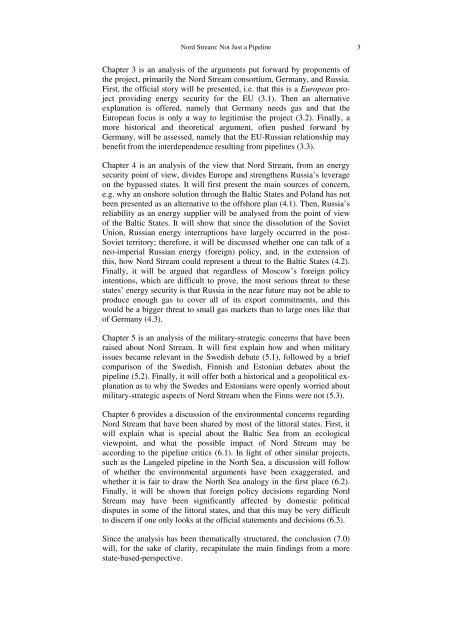Nord Stream: Not Just a Pipeline
Nord Stream: Not Just a Pipeline
Nord Stream: Not Just a Pipeline
Create successful ePaper yourself
Turn your PDF publications into a flip-book with our unique Google optimized e-Paper software.
<strong>Nord</strong> <strong>Stream</strong>: <strong>Not</strong> <strong>Just</strong> a <strong>Pipeline</strong> 3<br />
Chapter 3 is an analysis of the arguments put forward by proponents of<br />
the project, primarily the <strong>Nord</strong> <strong>Stream</strong> consortium, Germany, and Russia.<br />
First, the official story will be presented, i.e. that this is a European project<br />
providing energy security for the EU (3.1). Then an alternative<br />
explanation is offered, namely that Germany needs gas and that the<br />
European focus is only a way to legitimise the project (3.2). Finally, a<br />
more historical and theoretical argument, often pushed forward by<br />
Germany, will be assessed, namely that the EU-Russian relationship may<br />
benefit from the interdependence resulting from pipelines (3.3).<br />
Chapter 4 is an analysis of the view that <strong>Nord</strong> <strong>Stream</strong>, from an energy<br />
security point of view, divides Europe and strengthens Russia’s leverage<br />
on the bypassed states. It will first present the main sources of concern,<br />
e.g. why an onshore solution through the Baltic States and Poland has not<br />
been presented as an alternative to the offshore plan (4.1). Then, Russia’s<br />
reliability as an energy supplier will be analysed from the point of view<br />
of the Baltic States. It will show that since the dissolution of the Soviet<br />
Union, Russian energy interruptions have largely occurred in the post-<br />
Soviet territory; therefore, it will be discussed whether one can talk of a<br />
neo-imperial Russian energy (foreign) policy, and, in the extension of<br />
this, how <strong>Nord</strong> <strong>Stream</strong> could represent a threat to the Baltic States (4.2).<br />
Finally, it will be argued that regardless of Moscow’s foreign policy<br />
intentions, which are difficult to prove, the most serious threat to these<br />
states’ energy security is that Russia in the near future may not be able to<br />
produce enough gas to cover all of its export commitments, and this<br />
would be a bigger threat to small gas markets than to large ones like that<br />
of Germany (4.3).<br />
Chapter 5 is an analysis of the military-strategic concerns that have been<br />
raised about <strong>Nord</strong> <strong>Stream</strong>. It will first explain how and when military<br />
issues became relevant in the Swedish debate (5.1), followed by a brief<br />
comparison of the Swedish, Finnish and Estonian debates about the<br />
pipeline (5.2). Finally, it will offer both a historical and a geopolitical explanation<br />
as to why the Swedes and Estonians were openly worried about<br />
military-strategic aspects of <strong>Nord</strong> <strong>Stream</strong> when the Finns were not (5.3).<br />
Chapter 6 provides a discussion of the environmental concerns regarding<br />
<strong>Nord</strong> <strong>Stream</strong> that have been shared by most of the littoral states. First, it<br />
will explain what is special about the Baltic Sea from an ecological<br />
viewpoint, and what the possible impact of <strong>Nord</strong> <strong>Stream</strong> may be<br />
according to the pipeline critics (6.1). In light of other similar projects,<br />
such as the Langeled pipeline in the North Sea, a discussion will follow<br />
of whether the environmental arguments have been exaggerated, and<br />
whether it is fair to draw the North Sea analogy in the first place (6.2).<br />
Finally, it will be shown that foreign policy decisions regarding <strong>Nord</strong><br />
<strong>Stream</strong> may have been significantly affected by domestic political<br />
disputes in some of the littoral states, and that this may be very difficult<br />
to discern if one only looks at the official statements and decisions (6.3).<br />
Since the analysis has been thematically structured, the conclusion (7.0)<br />
will, for the sake of clarity, recapitulate the main findings from a more<br />
state-based-perspective.













